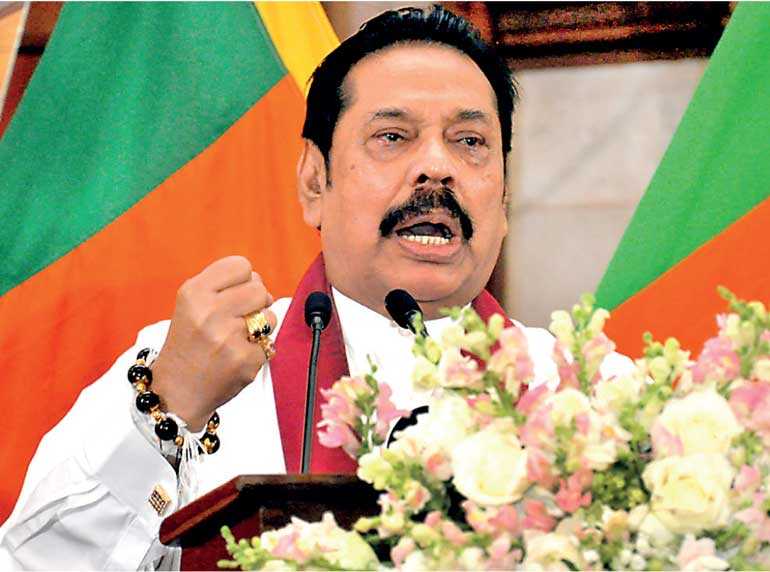Wednesday Feb 25, 2026
Wednesday Feb 25, 2026
Friday, 2 November 2018 00:00 - - {{hitsCtrl.values.hits}}
 Former President Mahinda Rajapaksa
Former President Mahinda Rajapaksa
The Government yesterday announced sweeping tax concessions and slashed prices on fuel, saying it was confident of meeting the budget deficit target of 4.9% for 2018 by sharply reducing expenditure by limiting the number of ministries.
The Finance Ministry announced wide-ranging changes in taxes spanning multiple sectors aimed at “encouraging production and simplifying the tax system.”
The new measures are targeted at giving relief to consumers and encouraging inward remittances and savings, the Finance Ministry said in a statement.
“The Government also expects to reduce its expenditure with the rationalisation of Cabinet ministries as reflected in a lesser number of ministries and re-examination of capital expenditure programs. Accordingly, the Government is confident that the primary surplus of 1.8% of GDP and the budget deficit of around 4.9% of GDP that have been targeted for 2018 could be achieved in support of further fiscal consolidation to provide economic stability. The measures for further consolidation of external trade and payment transactions are also being examined to provide much needed stability to the exchange rate,” it said. However, Central Bank Governor Dr. Indrajit Coomaraswamy last week said that Sri Lanka was heading towards a 5.3% budget deficit given the challenges faced due to weather problems.
As the 2018/2019 Maha cultivation season has begun with extremely favourable weather throughout the country, the economy is set to get a new revival as all hydropower reservoirs and irrigated schemes have reached full storage capacity to generate electricity, provision of drinking water and water for cultivation.
“The Government thinks that this is the best opportunity to prepare the country to get the maximum benefit from agricultural production. At the same time, the consumers are saddled with the high cost of living. Against this background, the Minister of Finance and Economic Affairs has given direction to implement the following initiatives to revive the economy.”
Accordingly, the Special Commodity Levy will be reduced on dhal by Rs. 5 per kg, chickpeas by Rs. 5 per kg, black gram by Rs. 25 per kg. Customs Duty will also be waived on wheat grain to Rs. 9 per kg from the existing waiver of Rs. 6 per kg. Sugar will be brought under the Special Commodity Levy whereby the applicable taxes on sugar will also be reduced by Rs. 10 per kg. Accordingly, the commodity prices will be reduced with immediate effect.
Given the impact of fuel pricing on all strata of society, especially those engaged in the transport, agriculture and fisheries sectors, the price of petrol (Octane 92) will be reduced by Rs. 10 per litre, auto diesel by Rs. 7 per litre and lubricants, including the 2T lubricants, used in three-wheelers and small agricultural engines by Rs. 10 per litre with effect from midnight today. At the same time, a cost-based pricing mechanism will be implemented on fuel in place of the monthly fuel price formula, it said.
A guaranteed price scheme will be introduced for paddy, onion and potatoes produced locally by farmers. Accordingly, the Special Commodity Levi (SCL) will be raised during the harvesting period to protect farmers through remunerative guaranteed prices. As potatoes and B-Onions are being harvested, SCL on potatoes and B-Onions will be maintained at Rs. 40 per kg.
In order to mitigate the impact of adverse weather conditions, which resulted in farmers losing their livelihood and becoming heavily indebted, interest and penal interest incurred by farmers and small paddy mill owners on loans up to a maximum of Rs. 50 million from all commercial banks during the past three years will be written off in full and will be borne by the Government.
The maximum threshold on loan advances given by Samurdhi Banks to Samurdhi beneficiaries to support their livelihood activities will be increased by Rs. 10,000.
Fertiliser prices for paddy will be maintained at Rs. 500 per 50 kg bag and fertiliser prices for other crops will be reduced to Rs. 1,000 per 50 kg bag from Rs. 1,500 per 50 kg bag.
The concessionary income tax rate of 14% on agriculture is presently applied only for the companies engaged in agricultural businesses. The income of individuals from agricultural undertakings will also be reduced from the existing maximum rate of 24% to 14% so that individual farming agriculture is also encouraged.
The concessionary income tax rate of 14% is presently applicable under the SME categories only for companies. This rate will be extended to include individuals providing professional services. Therefore, the income tax rate for professional services will be reduced from 24% to 14%.
Withholding tax will be exempted on interest on any savings and fixed deposits maintained in any financial institution.
To encourage local entrepreneurs, professionals and migrant workers to remit their earnings in foreign currency on services provided outside Sri Lanka, income tax will be exempted on such remittances.
The adverse impact created by high indirect taxes will be mitigated by the simplification of VAT and NBT. The VAT threshold will be increased from Rs. 12 million per annum to Rs. 24 million per annum.
The threshold for the VAT liability of the wholesale and retail sector will also be increased from Rs. 50 million to Rs. 100 million per 12 months, providing benefits to small traders and businesses.
The VAT rate applicable on the import of Sawn Timber will be reduced to 5% to support the local construction industry. VAT on the import of fabric will be exempt, providing benefits to small and medium-sized garment manufacturers. Considering the high tax imposed on telecommunication services, the Telecommunication Levy of 25% will be reduced to 15%.